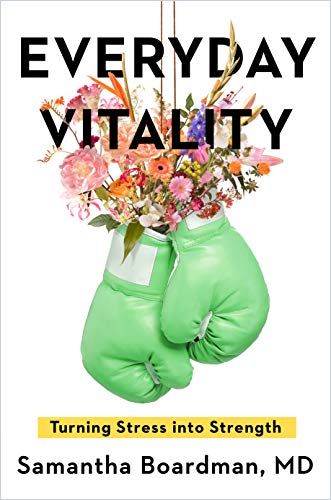Psychiatrist Samantha Boardman advises you to strengthen your interpersonal connections, sleep sufficiently and eat well for a healthier and happier you.

Connection Is Key.
Attending psychiatrist at Weill Cornell Medical College, Samantha Boardman holds degrees from Harvard, Weill Cornell Medical College and the University of Pennsylvania. She urges you to focus on increasing your happiness – instead of on reducing your unhappiness – by connecting with people, challenging yourself and creating meaning beyond yourself. Boardman explains that these wellsprings of vitality will help you become and stay happier.
Resiliency and Positivity
As a psychiatrist, Boardman focused on reducing her patients’ unhappiness and sought to nourish their enjoyment of life. Mid-career, she enrolled in the Applied Positive Psychology program under the aegis of the field’s founder, Martin Seligman. This led her to apply techniques that support her patients’ resiliency and positive outlook.
In patient after patient, I discovered that it’s possible to find wellness within illness, happiness within grief and strength within stress.Samantha Boardman
People who experience great stress have less robust immune systems. Boardman notes what most people will know from personal experience: Stressed individuals often crave comfort food or solitary, sedentary relaxation. These behaviors diminish your vitality.
Being resilient to the small hassles of daily life, however, increases your vigor. Boardman offers the metaphor of “Velcro” and “Teflon” people. Those who let stressors stick to them like Velcro tend to have more negative health issues.
Everyday opportunities and activities that foster growth and build positive resources are…the active ingredients of everyday resilience.Samantha Boardman
Whatever changes you want to make in your life, Boardman insists you go for them. Never underestimate your ability, she says, to make myriad alterations in your life at the same time.
Hard Goals
Tasks that require harder effort carry greater, lasting value. Boardman reminds you that an undemanding existence erodes your well-being.
Doing things that are ‘un-you’ can free you from behaving in a way that may be comfortable but stifling.Samantha Boardman
Having a more expansive sense of who you are boosts your positivity and makes you feel more attuned to yourself. However, comparing yourself to media celebrities or online influencers won’t help your self-image. Real role models, Boardman reminds you, should be those who help you become a role model for someone else.
Cultivating positive emotions creates changes akin to how nutritious food sustains your body. Humans suffer a negativity bias, which leads to a focus on unhappiness or on unfinished issues. This can motivate you, but also leave you emphasizing what you don’t accomplish instead of perceiving all that you do. Retrain your brain, Boardman advises, by focusing on the positive aspects of your day.
Interpersonal Connections
Boardman contradicts today’s common assumption by insisting that you do not have to search inside yourself to find happiness. Strong relationships, she reveals, have a positive impact on health, mood and longevity.
Self-focus might make you feel less vulnerable, but it can also seal you off from vitality.Samantha Boardman
Connecting with people in the real world gives you greater positive energy. Boardman urges you to reach out to others and be responsive to people in the moment. If your partner comes home with good news, for example, greet it with joy. Put the spotlight on your partner and his or her news instead of talking about your own experiences.
The ubiquitous use of technology in daily life, Boardman laments, undermines human connection.
Smartphones are the ultimate vampires of vitality.Samantha Boardman
Fully 89% of smartphone users admit to using their phones during the last social event they attended. Instead of consulting your phone when at dinner or driving your kids, Boardman counsels you to find out what’s new in your friends’ and your children’s lives.
Manifest Vitality
To generate vitality, Boardman suggests you acknowledge feelings of loss or sadness while relishing moments of joy. Challenge your brain and body instead of watching TV or scrolling social media. Get enough sleep, exercise and eat nutritious food.
Boardman makes a counterintuitive point: Emotionally healthy people also experience negative emotions. But they acknowledge discomfort to motivate themselves to make positive changes. Allow yourself to feel a wide range of emotions instead of trying to be upbeat all the time.
To boost your vitality, learn something new, whether a word or a skill. Remember that creating reduces stress. Take 20 minutes and focus on one thing – cooking dinner, walking or gardening. Experience joy in daily tasks simply by homing in on what you’re doing.
The more flow you experience in your daily life, the more vital and replenished you will feel.Samantha Boardman
Boost your energy by getting sufficient sleep. Boardman advises you to stick to a specific bedtime, and to keep technology out of your bedroom. Don’t use your phone as an alarm clock. Instead, buy a small one and charge your phone in another room. Getting sufficient sleep fuels a virtuous cycle; you’ll feel better the following day and sleep better the following night.
Exercise lifts your mood. Walking for 30 minutes three times a week is as effective, Boardman notes, as medication to alleviate depression symptoms.
Staying mindful about how you sit, stand and walk can also be helpful to your mood. Sitting upright increases your positivity and ability to cope better with stressors.
Mood has been shown to affect how we move, but the opposite is also true: How we move affects how we feel.Samantha Boardman
When you eat too much sugar, processed foods or saturated fats, you experience small stressors with greater intensity. That intensity of stress leads you to spiral into further unhealthy food choices.
Boardman recommends determining how the food you eat affects your mood and stress levels by tracking your consumption, mood and energy. The information you uncover may make the case for a change in your diet.
Review
Boardman writes for multiple magazines and media outlets. Her husband is an NYC real estate mogul and art collector. So, no matter how well-intentioned Boardman’s advice may be, there remains a whiff of Goop – that of the privileged offering the less well-off superficial, enthusiastic advice about well-being. This feels like her bid for self-help stardom, though you may have trouble distinguishing Boardman’s guidance from that found in any other contemporary self-help books. Still, her basic tenets are irrefutable, and following them will undoubtedly improve your outlook and health.
Samantha Boardman also wrote Ready for Anything. Other works on maximizing well-being include The Sweet Spot by Paul Bloom; Unwinding Anxiety by Judson Brewer; and Stop Overthinking by Nick Trenton.













